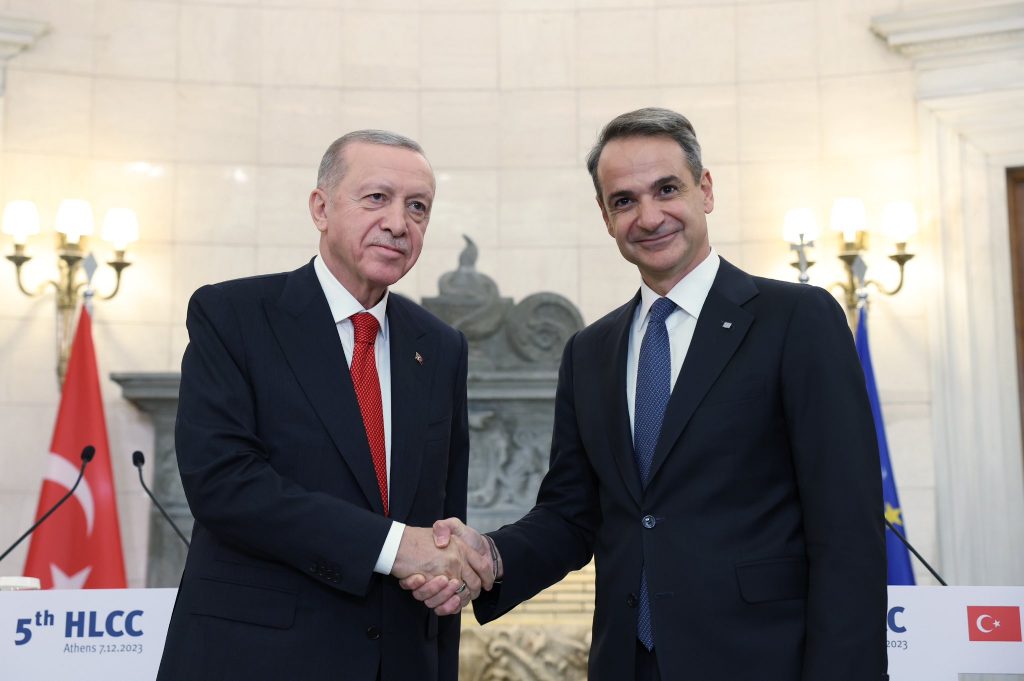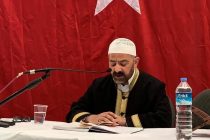It was all smiles between Turkish President Recep Tayyip Erdoğan and his Greek host, Prime Minister Kyriakos Mitsotakis, after the pair met in Athens as part of the 5th Greece-Turkiye High Level Cooperation Council.
The two leaders signed a joint declaration to pursue good neighbourly relations, marking a significant shift in how the historical foes will approach the common issues and opportunities they face.
“Geography and history have dictated that we live in the same neighbourhood … occasionally in confrontation. But I feel a historical responsibility to utilise this opportunity to bring the two states side by side, just as our borders are,” PM Mitsotakis said at a joint press conference after their meeting on Thursday, 7 December.
The leaders’ joint declaration was one of 15 signed agreements and memorandums signed on Thursday as part of a package of measures to increase co-operation between the two countries across a wide range of sectors, including trade, tourism, energy, transport, education and research.
One of the primary aims for the two NATO allies is to nearly double their existing bilateral trade from $5.5 billion (£4.38 bn) to $10 billion (£7.97bn).
“In our meeting with the Prime Minister, we agreed to increase our trade volume, which is currently around five billion dollars, to 10 billion dollars,” President Erdoğan said at the same press conference, adding, “We pointed out the importance of transportation projects such as the construction of the second bridge at the Ipsala-Kipi Border Gate.”
Prior to his meeting with Mitsotakis, President Erdoğan met with the Greek President Katerina Sakellaropoulou, where he stated: “I believe that the Turkiye-Greece strategic cooperation meeting will lead to a new era” in relations.
The two leaders’ distinctly friendly and positive remarks were in stark contrast to the harsh and often threatening rhetoric they used towards each other throughout 2022.
“We want to turn the Aegean into a sea of peace”
Adapting a phrase he used about Greco-Turkish relations when he last visited Athens in 2017, President Erdoğan said that “we need to be optimistic, and this optimism will be fruitful in the future. It will be much more beneficial for the future if we look at things from a glass half-full perspective.”
The two states have agreed to share know-how on coping with the impact of climate change, including the threat from more floods, forest fires and droughts. They also pledged to work together to combat illegal fishing and support rural development.
The reset in relations could also bode well for addressing long running and more complex disputes between Ankara and Athens, such as their competing claims on maritime rights in the Aegean Sea and also Cyprus.
“There is no issue between us that is unsolvable. So long as we focus on the big picture and don’t end up being like those who cross the sea and drown in the river,” President Erdoğan after his PM Mitsotakis in Athens.
“We want to turn the Aegean into a sea of peace. Through the joint steps we will take as Turkiye and Greece, we want to be an example to the world,” he added.
“Ege’yi barış ve iş birliği denizi hâline getirelim istiyoruz” https://t.co/lAta3m2BaF pic.twitter.com/nqIDGiRoSK
— T.C. Cumhurbaşkanlığı (@tcbestepe) December 7, 2023
President Erdoğan used the opportunity to raise the plight of Greece’s Turkish minority in Western Thrace, while also touching on a viable solution to resolve the Cyprus dispute.
“The Turkish minority in Greece and the Greek minority in our country are the building blocks of our human and cultural richness. Increasing the peace and welfare of minorities will positively affect our relations.
“We expressed our expectations for the improvements required by international law in the situation of the Western Thrace Turkish minority.
“A fair, permanent and sustainable solution to the Cyprus issue, based on the realities on the island, will be for the benefit of the entire region,” added President Erdoğan in an indirect reference to the failed federation model and the existence of two states in Cyprus.
The Turkish leader also proposed that Athens and Ankara should hold high-level meetings annually.
Some commentators described Thursday’s meetings and their outcome as a Greco-Turkish “lovefest” without parallel in the modern era.
One immediate beneficiary of this new warmer political climate was travel and tourism, with the Greek authorities restoring the automatic visa system for Turkish nationals making short visits to 10 Greek islands.





